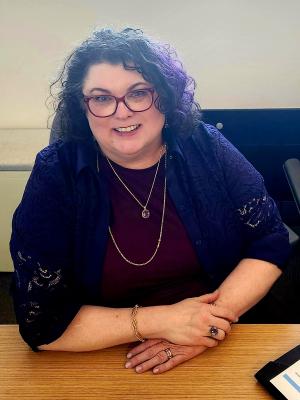Five questions for Kirsi Aulin
CU Boulder Ombuds Director Kirsi Aulin arrived on campus in 2016, coming from the ombuds office of the University of California, Santa Barbara. Today is Ombuds Day, as marked by the International Ombuds Association, but CU Boulder got a jump on the celebration last month, when Aulin helped the campus commemorate the 50th anniversary of her office.

“The 50th anniversary of the ombuds office is a significant event for CU Boulder. It means that generations of campus leaders have supported ombuds work and understand its value,” Aulin said. “This is a remarkable commitment from the campus as well as a remarkable achievement for the ombuds who came before us, and on whose shoulders we stand.”
Away from work, Aulin enjoys spending free time with her family and her two dogs, Nutmeg and Nikko.
“In the winter, there is nothing better than getting up on a mountain and skiing in some fresh powder,” she said. “I also enjoy baking, painting in oil, listening to a wide variety of music, and reading murder mysteries.”
1. What is the role of an ombuds office in a university setting?
We are an independent service embedded in the university, and our work is always informal and consultative. We have a dual mandate: We help individuals who reach out to our office, and we give feedback to the university about patterns and trends on campus so leaders can address them more effectively.
Here at CU Boulder, we serve anyone with a CU Boulder-related concern. In a confidential consultation, we help people understand their options within the university. We are impartial, which means we do not take sides in conflicts. Accordingly, we are in a unique position to truly help people strategize and analyze the options available to them from a neutral perspective.
2. Which concerns brought to your office are unique to different groups – faculty, staff and students – and which are common to all?
The most common issue people need assistance with is interpersonal communication. All groups also seek help navigating administrative processes and understanding university expectations.
Concerns that are unique to undergraduate students are: navigating academically related issues such as appeals, honor code violations, and retroactive withdrawals. Graduate students most commonly contact us regarding adviser relationships or problems with their program of study. Staff are often seeking assistance with supervisory relationships. Faculty are most often concerned about relationships and collaborations with colleagues.
3. Do you find there are misperceptions about what your office can and can’t do for members of the campus community?
One common misperception is that our office is a last resort and that people are supposed to exhaust all other alternatives first. This is not true! While we welcome everyone, we prefer people meet with us early on. If we can discuss a problem with someone before it snowballs, there are usually more desirable options available to them. No issue is too big or too small!
4. What are the steps that someone contacting the office and your staff go through when addressing an issue?
We work by appointment, and anyone can schedule a virtual or in-person appointment by calling our office at 303-492-5077.
A consultation is a collaboration between the ombuds and the consultee. The ombuds listens to their concerns and then explores options available at CU Boulder. Options may include direct services from the ombuds office, things the consultee can do themselves or services offered by other CU Boulder units. The consultee is then free to choose the option they prefer. Our direct services include communication coaching, conflict coaching, reviewing appeal letters, informal mediation, providing feedback to the university and strategizing.
5. How did you arrive at doing work as an ombuds and what do you enjoy most about it?
I had a career as a psychotherapist and had never actually heard of ombuds until a colleague sent me a recruitment notice. I enjoyed being a therapist and had no plans to leave the field; however, the ombuds position brought together both the skills of a therapist and the charge to work toward fairness and justice. I was absolutely thunderstruck! I did not know a job existed that brought together these two areas that are near and dear to my heart.
Fairness and justice have been a passion of mine since childhood. As a matter of fact, caring about them have been a family tradition. My family helped instigate the Finnish quest of independence in the late 19th and early 20th century. Once Finland became independent, my family helped build the justice system and the new democratic government. These values were ingrained in me as a child by my grandparents who were part of the independence movement, who fought in the war of independence, and who sacrificed much to achieve an independent democratic country.

